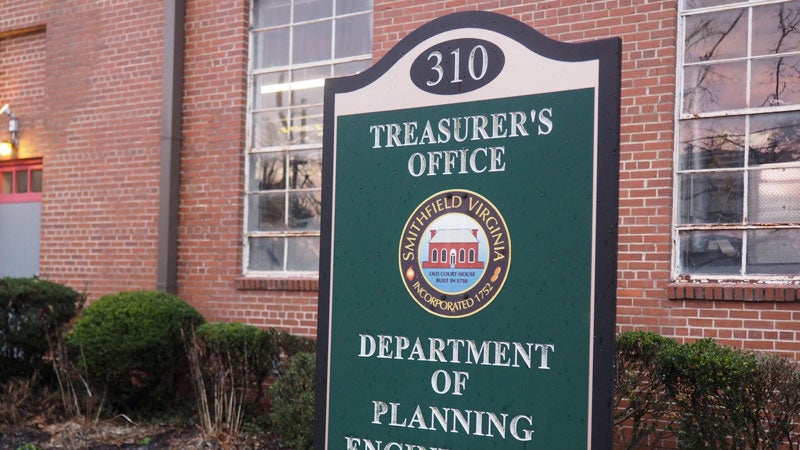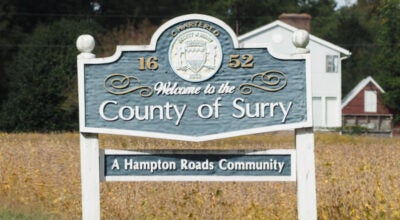Budget change would expand Smithfield planning department
Published 2:52 pm Thursday, May 30, 2024

- File photo
A change in Smithfield’s proposed 2024-25 budget would expand the town’s Community Development and Planning Department.
In response to a May 7 request by the Town Council, Town Manager Michael Stallings cut one of two budgeted new police officers included in his May 1 draft budget and proposed on May 28 to repurpose the roughly $81,000 to fund an additional planner.
The town currently employs one planner, Mark Kluck, to assist Community Development and Planning Director Tammie Clary with reviewing applications for rezoning and other permits. The second position would create an avenue of advancement for Kluck while providing for “an upcoming potential influx of permits,” Stallings said.
Town officials received a rezoning application last year for “The Promontory,” a proposed mixed-use development that would add 262 homes and five commercial parcels along the Benns Church Boulevard Corridor, and are expecting to receive a second rezoning application soon for the “Cottages at Battery,” a 130-home development proposed for 14 acres behind the Royal Farms gas station on South Church Street. The Town Council in February approved a zoning ordinance change requested by Cottages developer Brian Mullins that would allow him to apply for rezoning to attached residential.
Stallings said the replacement of the budgeted officer with a second planner has no impact on the proposed 2024-25 budget, which remains at $11.2 million, or 9.3%, higher than the $10.2 million budget for 2023-24.
Stallings has further proposed replacing a budgeted safety officer, which would have operated as a new position under Human Resources, with funding for a $70,000 space needs study for town offices and higher longevity retention bonuses for existing staff. The new longevity bonuses would increase an employee’s annual salary by $1,000 for one to five years of service, $1,500 for six to 10 years and $2,000 for 11 or more years.
The budget includes 4% raises for existing employees in addition to the longevity bonus. The town’s minimum hourly wage would rise from $12.50 to $15.
A public hearing on the budget, held May 28, drew only one speaker – Theresa Mulherrin – who urged the council to tie future raises in 2025 and beyond to “citizen satisfaction.” The council is scheduled to adopt its budget on June 4.
The proposed budget keeps the town’s real estate tax rate at 16 cents per $100 in assessed value, and proposes no other tax rate increases. It does, however, include a 6% increase in the town’s trash collection fee to $74.63 per residence per year, and a 25-cent, or 3.6%, increase of the town’s water rate to $7 per 1,000 gallons. The sewer rate, which is based on water usage, would rise from $3.74 per 1,000 gallons to $3.99.
The budget’s five-year capital improvements plan, intended for costly one-time expenses, lists $2.8 million for projects set to begin in 2024-25. The costliest include $696,790 for a concession stand serving the Luter Sports Complex’s football field, $850,000 for stormwater and drainage projects on Pagan and Battery Park roads, $175,000 for new police vehicles, a $170,000 bypass sewer pump, and $136,000 for the town’s share of the Park-to-Park Trail, intended to eventually connect Nike Park in Carrollton with Windsor Castle Park.
The CIP budgets an additional $100,000 per year for the Nike Park trail in fiscal years 2026-27 and 2027-28, and $675,000 in fiscal year 2028-29. According to Stallings, the $136,000 budgeted for the upcoming year is grant funding for a pedestrian and bicycle mobility plan that will allow the town to apply to Safe Streets and Roads For All, a federal program established by the 2021 Infrastructure Investment and Jobs Act or Bipartisan Infrastructure Law.
A $23 million proposal for funding Smithfield’s 1-mile portion of the trail from the Royal Farms on South Church Street to Windsor Castle Park scored poorly on an application last year for the fifth round of Smart Scale, a cost-versus-benefit formula the Virginia Department of Transportation uses to prioritize state funding. The county completed its 3.1-mile stretch of trail for $8.6 million in 2021, but Smithfield’s share is being driven up by the need to rebuild a two-lane stretch of South Church Street engineers have told town officials is too flat to accommodate curb-and-gutter drainage infrastructure for the proposed trail.





